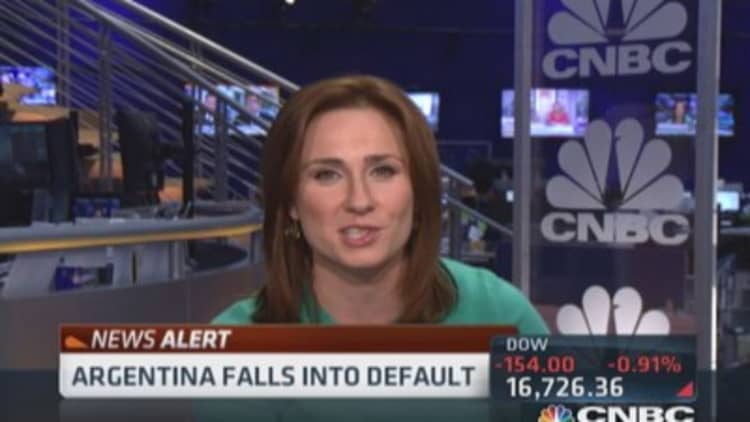Argentina is nearing its second debt default in 13 years. Soon, the International Swaps and Derivatives Association (ISDA) will make a ruling about whether Argentina officially "defaulted" on its debt.
The ruling determines whether the credit default swaps — essentially financial instruments bought as insurance against default — will pay out to those who bought them. An ISDA spokesperson told CNBC that about $1 billion in swaps on Argentina are outstanding. (If you're curious as to how that determination is made, here's a quick video explanation I did back in Jan. 2012 related to the Greece situation).
While the fight between Argentina and its creditors heats up, a quick reminder of something we have pointed out on "Street Signs" numerous times over the past few years: Somewhat counterintuitively, debt defaults historically are good for a nation's stock market.
Read MoreArgentina defaults and its stocks...rise?
The reasons are many, but the focus should primarily be on three things. First, currencies tend to drop in defaulting countries. Next, while bondholders take a haircut, monies that may have previously gone to interest payments are now partially freed up to spend on other, economy boosting projects. Also, as Warren Buffett and others have said many times, buying at times of maximum fear can often lead to the strongest long-term gains. Assuming one has the stomach (and excess capital) to ride out the risk.

Here are three interesting examples.
The Greece Athens Composite is up sharply since its debt haircut. It has gained 150 percent since June 2012.
Read MoreWhat happens to Argentina if it defaults (again)
The Russian RTS is up a staggering 3,000 percent since it nearly broke world markets by defaulting in 1998.
And ironically, no stock market seems to have benefitted more than Argentina's own. Since defaulting in 2001 and bottoming out around 200, the Merval is up 4,000 percent in 13 years. Yes, 4,000 percent.
However, if you're looking to invest in Argentina now take note: The Merval is already the single best performing stock market in the world this year, and history does not always follow the same course.
—By CNBC's Brian Sullivan


